
"I Heard It Through the Grapevine" is a song written by Norman Whitfield and Barrett Strong for Motown Records in 1966. The first recording of the song to be released was produced by Whitfield for Gladys Knight & the Pips and released as a single in September 1967. It went to number one on the Billboard R&B Singles chart and number two on the Billboard Pop Singles chart and shortly became the biggest selling Motown single up to that time.

Let's Get It On is the thirteenth studio album by the American soul singer, songwriter, and producer Marvin Gaye. It was released on August 28, 1973, by the Motown subsidiary label Tamla Records on LP.
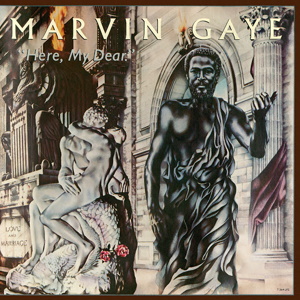
Here, My Dear is the fifteenth studio album by American singer and songwriter Marvin Gaye, released as a double album on December 15, 1978, on Motown-subsidiary label Tamla Records. Recording sessions for the album took place between 1977 and 1978 at Gaye's personal studios, Marvin Gaye Studios, in Los Angeles, California. The album was notable for its subject matter focusing largely on Gaye's acrimonious divorce from his first wife, Anna Gordy Gaye.

"Got to Give It Up" is a song by American music artist Marvin Gaye. Written by the singer and produced by Art Stewart as a response to a request from Gaye's record label that he perform disco music, it was released in March 1977.
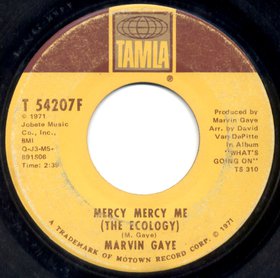
"Mercy Mercy Me (The Ecology)" is the second single from American singer-songwriter Marvin Gaye's 1971 album, What's Going On. Following the breakthrough of the title track's success, the song, written solely by Gaye, became regarded as one of popular music's most poignant anthems of sorrow regarding the environment. Led by Gaye playing piano, strings conducted by Paul Riser and David Van De Pitte, multi-tracking vocals from Gaye and the Andantes, multiple background instruments provided by the Funk Brothers and a leading sax solo by Wild Bill Moore, the song rose to number 4 on Billboard's Pop Singles chart and number one for two weeks on the R&B Singles charts on August 14 through to August 27, 1971. The distinctive percussive sound heard on the track was a wood block struck by a rubber mallet, drenched in studio reverb. The song also brought Gaye one of his rare appearances on the Adult Contemporary chart, where it peaked at number 34. In Canada, "Mercy Mercy Me" spent two weeks at number 9.
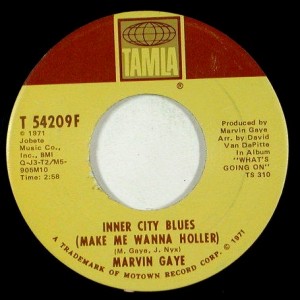
"Inner City Blues (Make Me Wanna Holler)", often shortened to "Inner City Blues", is a song by Marvin Gaye, released as the third and final single, and the climactic song from his 1971 landmark album, What's Going On. Written by Gaye and James Nyx Jr., the song depicts the ghettos and bleak economic situations of inner-city America, and the emotional effects these have on inhabitants.

"I Want You" is a song written by Leon Ware and Arthur "T-Boy" Ross and performed by American singer and songwriter Marvin Gaye. It was released as a single in 1976 on his fourteenth studio album of the same name (1976) on his Tamla label. The song introduced a change in musical styles for Gaye, who before then had been recording songs with a funk edge. "I Want You", among other similar songs, gave him a disco audience. Ware, who produced the song alongside Gaye, also was attributed with the single's success.
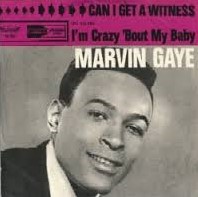
"Can I Get a Witness" is a song composed by Brian Holland, Lamont Dozier, and Eddie Holland and produced by Brian Holland and Lamont Dozier as a non-album single for American recording vocalist Marvin Gaye, who issued the record on Motown's Tamla imprint in September 1963.
"That's the Way Love Is" is a 1967 Tamla (Motown) single recorded by The Isley Brothers and produced by Norman Whitfield.

"Distant Lover" is the sixth song issued on singer Marvin Gaye's 1973 album, Let's Get It On and the B-side of the second single from that album, "Come Get to This". A live recording was issued as a single in 1974. The live version of the song was Gaye's most successful single during the three-year gap between Let's Get It On and his following 1976 album, I Want You.
"Stubborn Kind of Fellow" is a 1962 song recorded by Marvin Gaye for the Tamla label. Co-written by Gaye and produced by William "Mickey" Stevenson, "Stubborn Kind of Fellow" became Gaye's first hit single, reaching the top 10 of the R&B chart and the top 50 of the Billboard Hot 100 in late 1962.

Midnight Love is the seventeenth studio album by Marvin Gaye and the final album to be released during his lifetime. He signed with the label Columbia in March 1982 following his exit from Motown.
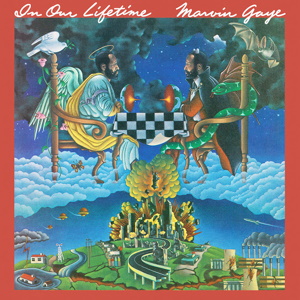
In Our Lifetime is the sixteenth studio album by soul musician Marvin Gaye, released January 15, 1981, on Motown label Tamla Records. Recording sessions for the album took place at Marvin's Room in Los Angeles, California, Seawest Recording Studio in Honolulu, Hawaii, and at Odyssey Studios in London, England, throughout 1979 and 1980. The album cover was designed by Neil Breeden. Gaye's final album for Motown before leaving for Columbia Records, the album was the follow-up to the commercial failure of Here, My Dear, a double album which chronicled the singer's divorce from Anna Gordy. Entirely written, produced, arranged, and mixed by Gaye, In Our Lifetime was a departure for Gaye from the disco stylings of his previous two studio efforts and was seen as one of the best albums of the singer's late Motown period.
"Praise" is a 1981 gospel-inspired disco number released by American soul singer Marvin Gaye. The song, written by Gaye, is a tribute to not only his church upbringing but also to the sound of then-label mate Stevie Wonder, who is given a shout out on the song by Gaye. In the song, he persuades a lady to be positive in difficult times and let her "love come shining through". He then moves forward to praise God, similar to how a preacher would recite such passages from The Bible.
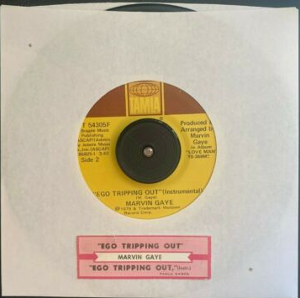
"Ego Tripping Out" is a 1979 funk-styled dance record released by American soul singer Marvin Gaye, released as a single on the Tamla (Motown) label. The record was originally meant to be the lead single for the singer's aborted Love Man album. However, as the album was scrapped and reworked into In Our Lifetime, the song received further work, before being omitted from the final album tracklist. The single was later included in a 1994 re-release of In Our Lifetime and a 2007 re-release deluxe edition featured two different alternate mixes for the sessions of In Our Lifetime as well as the original Love Man single of it.
"You" is a 1967 single released by American singer Marvin Gaye on the Tamla label.
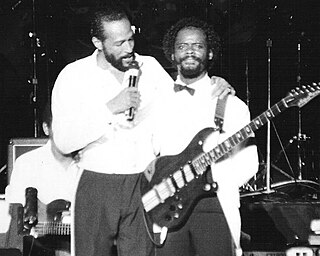
Gordon Banks was an American guitarist, producer, writer and musical director. He was voted one of the top 100 guitarists in America by Rolling Stone magazine in 1985.
"Midnight Lady" is the first track on Marvin Gaye's 1982 album, Midnight Love. It contains sly references to Rick James and his hit, "Super Freak".

"Pops, We Love You" is a 1978 single recorded and released by Motown stars Diana Ross, Marvin Gaye, Smokey Robinson and Stevie Wonder, as a tribute to Berry "Pops" Gordy Sr., who had died that year from cancer.














